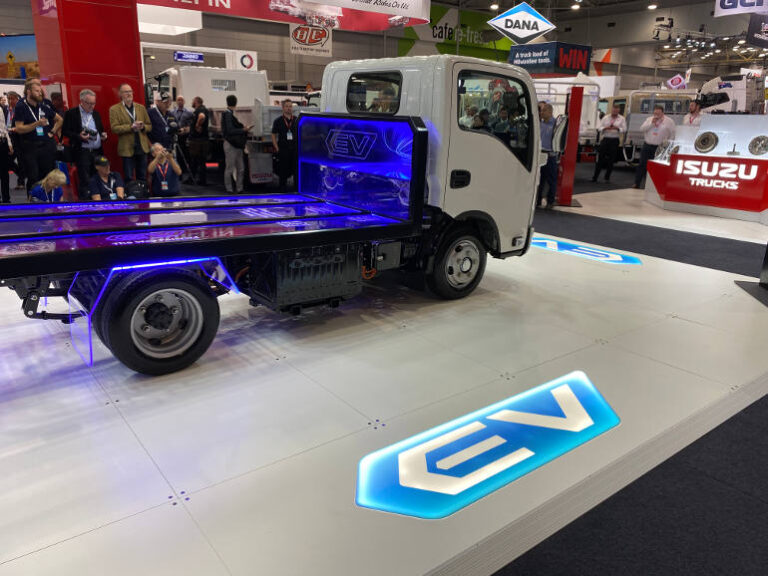The Isuzu “Future of Trucking Report” reveals a clear interest among Australian businesses to transition towards electric vehicles (EVs) and zero-emission strategies. According to the report, 91% of surveyed businesses are considering adopting zero-emission solutions for their fleets, signifying a growing recognition of the need for sustainable transport options. However, the pace of adoption varies: only 10% of businesses are currently implementing zero-emission strategies, while 40% plan to introduce them within two years and another 41% within a decade.
This push for electric solutions is driven primarily by rising fuel costs, which remain the top challenge for fleet operators, along with the need to improve operational efficiency. The survey indicates that 31% of businesses believe that electric trucks will play a key role in their fleets within the next 10-15 years, marking a significant step towards reducing the carbon footprint of the road transport sector.
Improving Perceptions of Electric Vehicles
The perception of electric trucks has improved since the last report, with 55% of respondents considering them suitable for Australian conditions—up from 46% in 2020. Similarly, 55% believe electric trucks are reliable, while 51% think they hold strong residual values. Despite this positive shift, challenges persist, particularly concerning charging infrastructure and time. A majority (64%) still agree that charging times are too long, and only half of the respondents feel that charging infrastructure is adequate in their operational areas.
The mixed responses suggest a need for continued awareness and information about the viability of electric trucks in commercial use. For instance, 25-30% of respondents remain neutral on key aspects of electric trucks, indicating a knowledge gap that original equipment manufacturers (OEMs) and industry stakeholders must address through clearer communication and demonstration of benefits.
Sectoral Variations in EV Adoption
Adoption rates of electric vehicles differ across industry sectors. The transport, postal, and warehousing sector shows the highest inclination towards electric trucks, with 41% of respondents seeing them as the primary fleet solution in the next 10-15 years. Meanwhile, public administration and safety sectors are more cautious, with only 15% expressing a similar sentiment.
A significant factor impacting adoption is infrastructure readiness. Sectors that have already ventured into electric vehicle implementation, such as transport and utilities, report greater concerns about charging times and infrastructure adequacy. This is likely due to their direct experience with early-stage EV challenges, highlighting the importance of developing robust charging networks and regulatory support to facilitate wider adoption.
Barriers to EV Transition
The transition to electric vehicles in Australia has been gradual, partly due to the lack of a cohesive regulatory framework and incentives, as well as limited investment in nationwide charging infrastructure. While these gaps have slowed the momentum, the overall sentiment towards decarbonising transport remains strong. The report underscores the need for consistent policy support to accelerate EV uptake, as well as strategic investment in infrastructure to enhance feasibility.
Operational Savings and Environmental Commitments
Electric vehicles are seen not only as a solution for reducing emissions but also as a potential means for operational savings. As fuel prices continue to rise, businesses are increasingly recognising the cost benefits of electric vehicles in the long run. The transport sector’s shift towards electric solutions aligns with broader corporate objectives, such as meeting environmental targets and reducing operational costs. The report also points out that 19% of Australia’s total emissions come from the transport sector, making EV adoption a critical component of national emissions reduction strategies.
The Path Forward: Challenges and Opportunities
While the trucking industry has started embracing electric vehicles, the report emphasises that a collaborative effort involving industry stakeholders, government bodies, and infrastructure developers is crucial for a successful transition. Key challenges include aligning new technologies with current infrastructure capabilities and improving public awareness of electric vehicles’ benefits and practicality.
Nevertheless, the growing interest in electric vehicles reflects a positive shift in attitudes and readiness for change within the industry. With adequate policy support, improved infrastructure, and continued education on EV benefits, the Australian trucking sector can accelerate its transition to a more sustainable future.
The report presents a hopeful yet realistic picture of the future of electric vehicles in the Australian trucking sector. The strong appetite for zero-emission vehicles, coupled with evolving perceptions and strategic planning, indicates that electric trucks will play an increasingly significant role in reducing transport emissions over the next decade. Addressing current challenges, particularly in charging infrastructure and operational knowledge, will be key to making this transition smoother and more efficient.






